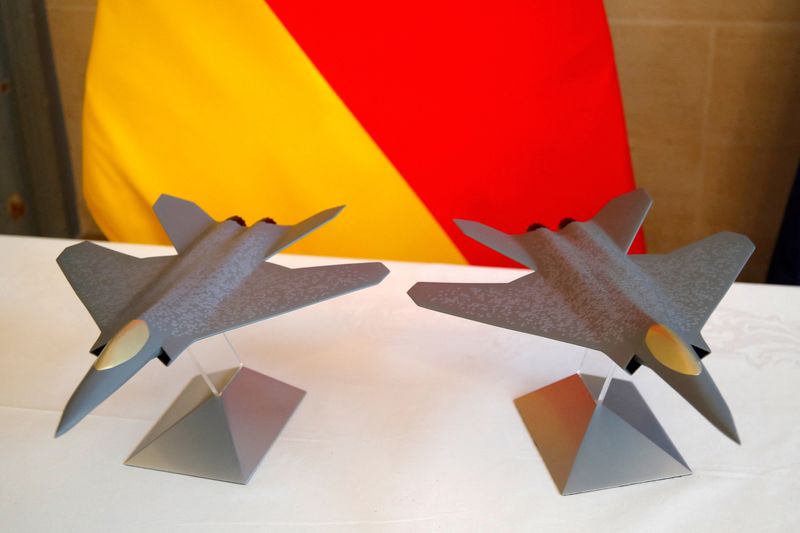By Tim Hepher
PARIS (Reuters) - Airbus has launched a review of its defence strategy that could open the door to more strategic partnerships as Europe's arms makers juggle security threats and pressure from some investors, people familiar with the matter said.
The most far-reaching examination of defence goals in years is being spearheaded by the company's board in a sign of growing independence from its government shareholders, though any major changes would need political backing of France and Germany.
Top management of Europe's biggest aerospace group strongly backs defence as a source of stable revenues, political support and access to R&D funding. But the mainly independent board has the final say on strategy, subject to national security.
The business faces a number of challenges, with France and Germany struggling to finalise plans for a costly new combat jet involving Airbus and Dassault Aviation, and the industry facing growing pressure from investors increasingly focused on environmental, social and governance (ESG) matters.
In 2020, Airbus pledged to follow the path of aerospace firms that "nurture a substantial defence and space element in their portfolio to gain synergies and increase stability."
But the board, led by former Deutsche Telekom (OTC:DTEGY) chief Rene Obermann, is carrying out a deeper than usual dive as part of a rotating study of Airbus businesses, the people said, declining to be named over confidential discussions.
Airbus said it does not comment on any board discussions.
No immediate decisions are expected, though the people did not rule out more reliance on joint ventures or "strategic partnerships" to deliver on collaborative programmes.
The ESG issue came to the fore in September when Airbus was only able to join the enlarged DAX share index in Germany after a debate over inclusion of firms handling certain types of arms.
Airbus builds launchers for France's nuclear deterrent but stresses it does not make warheads. Defence firms have also sought to draw a distinction between arms that preserve national security and more controversial weapons like landmines.
Anti-arms industry groups reject such distinctions.
The issue weighs especially heavily as the European Union draws up a crucial list of socially sustainable investments.
"We have the first financial institutions that say we don't want to invest in such companies any more," Airbus Defence & Space CEO Michael Schoellhorn told journalists in November.
Chief Executive Guillaume Faury, who also heads France's main aerospace lobby, is leading an industry fightback and has questioned the logic of squeezing firms involved in national security at a time when the industry is also tackling emissions.
"There will be no decarbonisation if the world is in conflict ... if we don't ensure security," Faury told Reuters in November. "We think security is at the core of ESG values."
STEADY REVENUE
Airbus was born as a jetliner consortium in 1969 but today's group springs from a merger of civil and defence assets in 2000.
The creation that year of a new parent group, EADS, reflected the belief that Europe's fragmented arms sector needed to punch its weight against newly merged U.S. defence giants.
But efforts to balance civil and defence portfolios collapsed with the failed takeover of BAE Systems (OTC:BAESF) in 2012 and EADS was eventually folded into the core civil planemaker under a board that was handed greater independence from governments.
France and Germany maintain 11% each of the shares and a veto over certain strategic interests.
Defence revenues across divisions have been broadly steady since Airbus sold its defence electronics business in 2017 to help pay for losses on the A400M airlifter, totalling just under 11 billion euros ($12.5 billion).
Although the lack of growth has attracted critics, such stability was welcomed when the pandemic slashed civil demand. France, Germany and Spain have also placed new defence orders.
Defence revenues as a percentage of the group total - 21% - was 4 percentage points higher in 2020 than in 2017 and matched levels last seen in 2012 when Airbus tried to forge Europe's largest defence company by buying BAE Systems.
That's in contrast to the situation in 2019 when a pre-pandemic boom in civil jets pushed defence revenues down to 14% of the total, the lowest share in at least a decade.
Threats have meanwhile expanded to included the crisis in Ukraine. Arms spending by European Union states rose 5% to 198 billion euros in 2020, according to the European Defence Agency.
Although based in France, Airbus mainly represents Germany and Spain in European defence projects, with Germany's Green-backed coalition seen as less friendly to defence exports.
"It is not an option for Airbus to get out of defence, it would cut the rope that provides backup from its core nations," a senior European defence source said.
However, some European defence sources and analysts say Airbus faces challenges to deliver its vision of a digitally interconnected "combat cloud" for Europe's new fighter jet project on its own after selling off electronics.
Airbus and Dassault have yet to agree a detailed work plan. "(This) delay highlights far deeper tensions in the overall programme," Agency Partners analyst Sash Tusa wrote in a note on Wednesday, adding France was increasingly considering a go-it-alone option to replace its Rafale warplanes.

($1 = 0.8800 euros)
(The story refiles to fix ESG acronymn in paragraph four.)